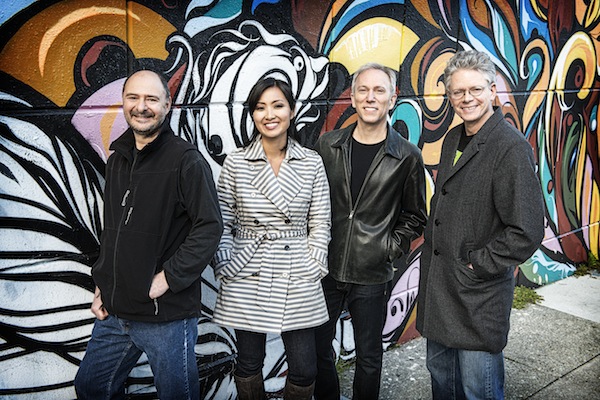New works (mostly) thrive alongside mainstays in Kronos’s Carnegie showcase

The Kronos Quartet’s concert Saturday night in Zankel Hall was unusual for this group: it was conventional. Other than the lighting design and occasional amplification — required for Terry Riley’s Sun Rings and Steve Reich’s Different Trains, the manner of the concert was like any other; a series of pieces intercut with applause and bows, and even an intermission.
The format was deceiving though. Kronos always brings a concept, and Saturday it was the subtle but vital one of introducing new repertoire. Kronos has a commissioning project called “Fifty for the Future,” introducing ten new works for each year of a five year span. And more than just being new, the pieces are meant to train students and developing quartets in contemporary music. All the scores and parts will be available as free downloads from Kronos’ website.
This is an ingenious idea. By default string players learn the style and techniques of the classical repertoire, but nothing prepares them to tackle the specific demands of the contemporary quartet literature, from Philip Glass to Caroline Shaw, which instead of building off the work of Debussy, Webern and Ligeti, emphasizes quick-changing repetitive structures and rhythmic precision.
Kronos played four “Fifty” pieces, one of them a world premiere from Bryce Dessner, the others from Glass, Missy Mazzoli, and Misato Mochizuki. The challenge for these composers was to make music that explores contemporary styles without being overly demanding, while also being interesting. Glass’s Quartet Satz, Mazzoli’s Enthusiasm Strategies, and Mochizuki’s Boids were fine examples of this in terms of both professional craft and aesthetic imagination.
Harmony is at the core of Glass and Mazzoli’s thinking. Quartet Satz had some of the composer’s most familiar cadences, and the music seemed just slowed-down and opened-up enough for a clear view of its workings — one could imagine young musicians learning while playing. The charm and simplicity were Schubertian, and an excellent follow-on from the concert’s opening work, Michael Gordon’s sunny and extroverted Clouded Yellow.
No one alive makes more out of the basic movement from major to minor then Mazzoli, and Enthusiasm Strategies was a distillation of the beauty and emotional depth of her her music, a foundational drive moving intervals and triads through prismatic variations. The title Boids is a computer simulation for a group of flocking animals, like birds or fish. As those will suddenly change direction as a group, so Mochizuki put that idea into music, with the upper strings steadily accelerating through rising scales, until a plucked chord from the cello had them starting over in a new direction. (The young cellist Paul Wiancko was substituting for Sunny Yang, who is on maternity leave, and fit so well into the quartet that one noticed no difference or drop-off from the groups sound and ensemble precision.)
Kronos opened the second half with Dessner’s Le Bois, a random jumble of simple, repeated phrases. Dessner is one of the leaders of the popular rock group The National, and has had the enviable experience of having Kronos and other major ensembles pay for and play his music.
Le Bois was a scar across a concert that otherwise furthered the caused of music. Heard numerous times across the past several seasons, Dessner’s music shows no ability to handle form or develop musical ideas in an interesting way. At ten minutes, the experience was interminable. It’s bad enough that his social status gives him opportunities that, as they are in limited supply, will never go to any other composer, but the point was to create something that would train young musicians, and it was not even a competent undergraduate-level work. Any ensemble that commissions Dessner, including Kronos and the New York Philharmonic, is diminishing the musical world.
That flaw could not be erased but could be overcome. One was impressed by the joy in Kronos’ playing of Clouded Yellow, and welcomed two of the finest works in their own repertoire, Sun Rings and, of course, Different Trains.
Kronos played two excerpts from Sun Rings, “The Electron Cyclotron Frequency Parlour” and “One Earth, One People, One Love.” The piece mixes the quartet’s playing with prerecorded audio, mainly collected sounds of solar particles interacting with magnetic fields in space — the sounds of man and the sounds of the universe. The first excerpt was frustrating, lacking atmosphere, but “One Earth” worked as an individual piece, with Alice Walker’s measured chant of the title and astronaut Gene Cernan’s thoughts on seeing Earth from space connecting the listener to the larger world of existence.
Kronos premiered Different Trains in 1988 and still plays it like no other group. They wrap themselves inside the audio. Prerecorded playing by the quartet, train whistle sounds, sampled text that moves back and forth between memories about train travel across the United States and the trains that took Jews to concentration camps in WWII — these are the piece itself; the live musicians accompany it. Kronos understands this, and they followed the music through its determination and sublime beauty.
Clarinetist and composer Jörg Widmann performs with the International Contemporary Ensemble, 7:30 p.m., January 28. carnegiehall.org






